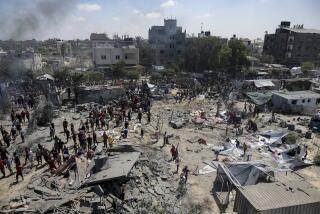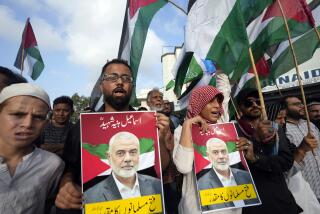Israel Will Try Key Palestinian
JERUSALEM — Striking near the top of the Palestinian hierarchy, Israel announced Thursday that it would put one of Yasser Arafat’s closest and most popular deputies on trial for allegedly orchestrating terrorist attacks against Israeli citizens.
The government said Marwan Barghouti, leader of the Palestinian Authority president’s Fatah faction in the West Bank, would stand trial in civilian court--not before a military tribunal, as is usual in such proceedings--because of his suspected seniority in a Fatah-linked militia group and his alleged connection to “many terrorist acts” in Israel.
However, Justice Ministry spokesman Yaakov Galanti declined to specify which incidents Barghouti is accused of instigating, saying details would have to wait.
“The indictment is not ready yet,” Galanti said. “We assume that it will take a few weeks,” with the trial to follow soon afterward.
Barghouti has been in jail and under interrogation since an intensive manhunt by Israeli special forces resulted in his arrest April 15 in Ramallah, the West Bank city where Arafat’s headquarters are located.
Barghouti, 42, is the most senior Palestinian official to be taken into custody during Israel’s recent offensives in the West Bank.
A firebrand known for his street-side speeches and public rallies, he is considered by many to be second only to Arafat in popularity among Palestinians, especially the young.
Israeli authorities suspect that he is at the center of a web of dozens of armed attacks, starting with shootings of soldiers and civilians and leading, eventually, to suicide bombings.
By trying Barghouti in public and tying him to violent action, the government of Prime Minister Ariel Sharon clearly hopes to implicate Arafat as well and discredit his leadership.
“Barghouti’s office served as a meeting place where terrorists would come to get details, report their actions or receive arms,” Brig. Gen. Ilan Katz, a military prosecutor, told Israeli television Thursday night. “In some cases, Marwan Barghouti knew or should have known about the perpetration of certain terrorist attacks.”
Barghouti reportedly has confessed under questioning to planning such operations with Arafat’s approval. However, his lawyer, Jawad Boulos, denied that his client has admitted anything.
“Marwan did not confess and did not sign” anything, Boulos said Thursday. “I challenge Israel to show you or anybody any statement or document signed by Marwan.”
He said prosecutors’ evidence will almost certainly rest on the testimony of others and not that of Barghouti himself, in spite of his treatment at the hands of Israeli investigators, whom Boulos accused of depriving his client of sleep and keeping him sitting on a small plastic chair for hours on end, his hands tied behind his back.
Boulos criticized the Israeli government for taking nearly three months to decide to prosecute, while Barghouti was held for the most of the time in solitary confinement.
In protest over Barghouti’s detention, Boulos said he would not cooperate in any trial but would instead concentrate on having the charges against his client dismissed or challenging the competence of the court.
Galanti said assembling the case against Barghouti was “very complicated,” a lengthy process of weaving together evidence from a number of witnesses and linking it to the charismatic Palestinian official.
In addition to Barghouti, four other Palestinians are to stand trial in open court for allegedly instigating terrorist attacks, including a suicide bombing in March at a hotel in Netanya that killed 29 people and wounded more than 70 others.
Two of those four defendants, Galanti said, operated under Barghouti’s direct command as members of the Fatah-related Al Aqsa Martyrs Brigade, in Ramallah and another West Bank city, Nablus.
Because of his prominence and popularity--some observers consider him a possible successor to Arafat--Barghouti’s arrest has stirred up strong emotions among his followers as well as his enemies.
After the army nabbed him at the home of a fellow Fatah activist, anger ran so high that at least one Palestinian was killed by a mob that apparently suspected him of helping Israel capture Barghouti.
A Palestinian legislator warned at the time that putting Barghouti on trial in an Israeli courtroom would “have dangerous repercussions.” A “Free Marwan Barghouti” Web site has sprung up, and his pictures have been posted around Ramallah.
On the other side are right-wing Israeli officials who have publicly declared their desire to see Barghouti put to death--and not necessarily after due process.
“What are you interrogating him for?” Effi Eitam, a Cabinet minister and leader of the hard-line National Religious Party, said at a public appearance last week, according to the Maariv newspaper. “Take him to some orchard and give him a bullet in the head.”
Despite the allegations against him, Barghouti has long insisted that he is a political leader only, a man of his people who attended their funerals and took to the streets with them. He is one of the few Palestinian leaders to have cultivated a mass following. And there are some who still regard him as a pragmatist willing to see a Palestinian state coexist beside Israel.
On Monday, he was transferred to a jail in central Jerusalem where conditions are so squalid that he has launched a hunger strike, his attorney said. Barghouti shares a tiny, bug-infested cell with four other detainees, but his complaints have been ignored, Boulos said.
Besides announcing its plans to put Barghouti on trial, Israel also defended its closure this week of the offices of a respected Palestinian academic whom many consider to be a leading voice of moderation in the conflict.
The government’s decision to shut down the office of Al Quds University President Sari Nusseibeh drew a rare rebuke from the Bush administration. The White House on Wednesday called it a “troubling event” that “does not contribute to the fight against terror.”
Nusseibeh, an Oxford-educated philosophy professor and Arafat’s top official in Jerusalem, has publicly urged his compatriots to stop carrying out suicide bombings and argued that they must give up their claim to a right of return to lands in Israel once held by Palestinians--one of the most contentious issues in the collapsed Mideast peace process.
But Uzi Landau, the Israeli minister for public security, said his order to search and shut down Nusseibeh’s office, which took place while Nusseibeh was out of the country, was necessary to prevent “the long arm” of the Palestinian Authority from undermining Israel’s sovereignty over Jerusalem.
Critics said the raid would only alienate an important moderate at a time when both Israel and the U.S. have stressed the need to find Palestinian leaders other than Arafat to deal with.
In Washington, meanwhile, President Bush on Thursday called Egyptian President Hosni Mubarak and Jordan’s King Abdullah.
The telephone conversations focused on regional developments since Bush’s June 24 speech on the Middle East, in which he called for a change in Palestinian leadership, and the next steps in the peace process, according to a National Security Council official.
Secretary of State Colin L. Powell is scheduled to travel to New York early next week to meet with officials from the so-called quartet--the U.S., the United Nations, the European Union and Russia. The group is overseeing efforts to revive Mideast peace talks.
Powell will also hold talks with the foreign ministers of Egypt and Jordan on Tuesday in New York and the Saudi foreign minister on Thursday in Washington, according to the State Department.
*
Times staff writer Robin Wright in Washington contributed to this report.
More to Read
Sign up for Essential California
The most important California stories and recommendations in your inbox every morning.
You may occasionally receive promotional content from the Los Angeles Times.











